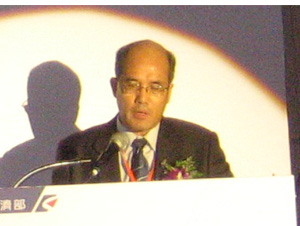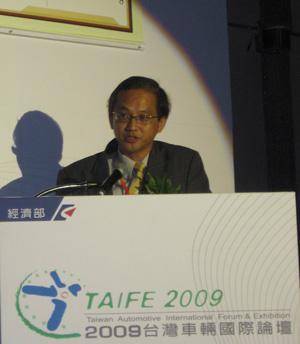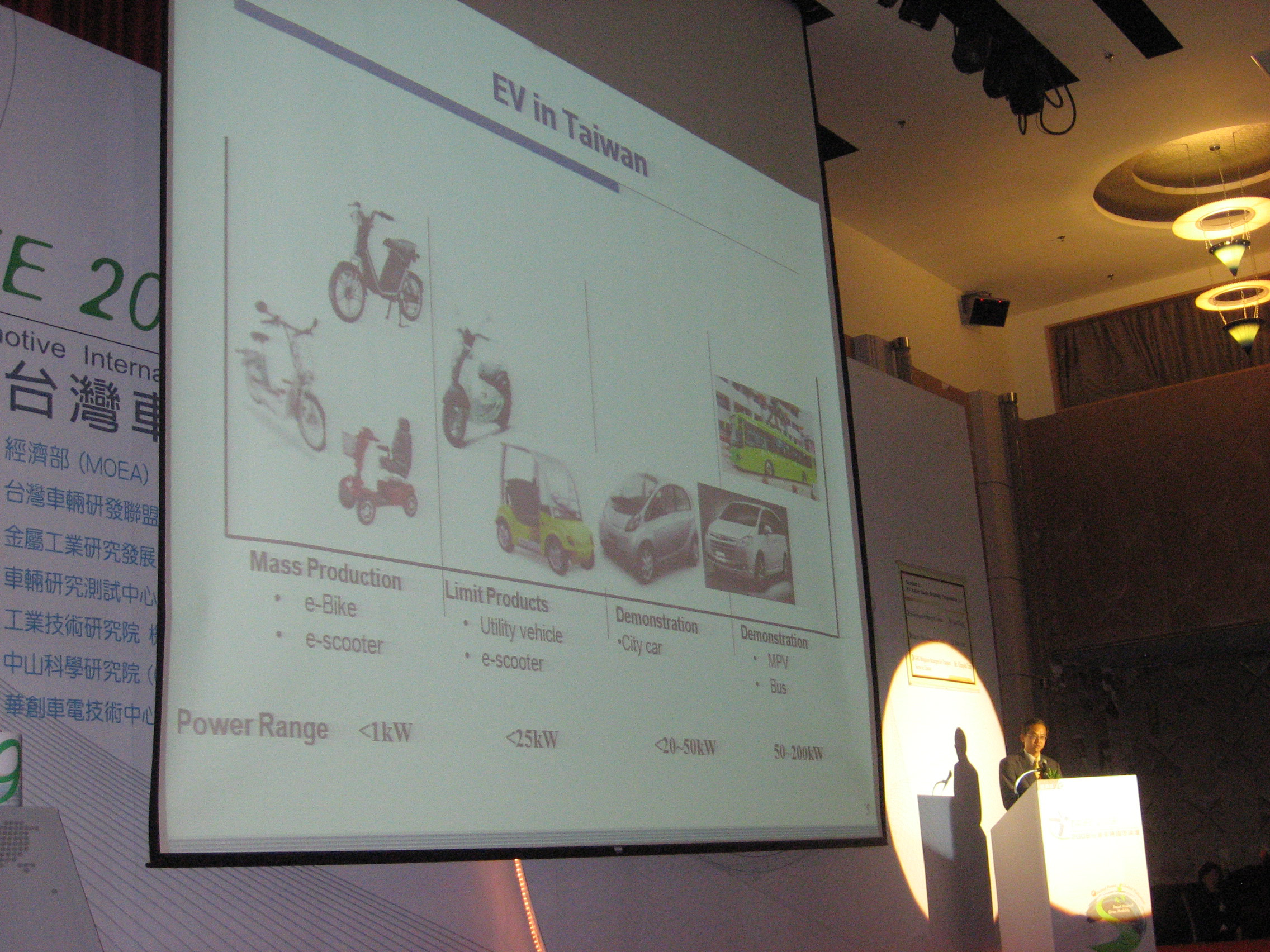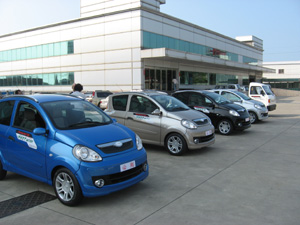TAIFE 2009 Focuses on EV With 'Smart Control and Green Mobility' Theme
2009/08/04 | By Quincy LiangThe 5th Taiwan Automotive International Forum & Exhibition (TAIFE 2009), held at the NTUH International Convention Center in Taipei July 15~16, 2009, brought together leading experts from industrial, governmental and academic fields, as well as more than 400 interested parties from various fields, a record high number. This year's forum continued the TAIFE slogan "Oriental Power vs. Global Pulsation," with the theme "Smart Control and Green Mobility" being focused on the electric vehicle (EV).
Sponsored by the Ministry of Economic Affairs (MOEA), the TAIFE 2009 was organized by the Taiwan Automotive Research Consortium (TARC), the main driver of the island's automotive industry that can tap the collective resources of its members, including the Mechanical and System Research Laboratories (MSL) of Industrial Technology Research Institute (ITRI), the Automotive Research and Testing Center (ARTC), the Chung-Shan Institute of Science and Technology (CSIST), and the Metal Industries Research and Development Center (MIRDC), and Hua-chuang Automobile Information Technical Center Co. Ltd. (HAITEC) as well as about 120 private suppliers and manufacturers.

Still in Infancy
Taiwan's Economics Minister Yiin Chii-ming, in his opening speech, pointed out that global EV development is still in its infancy. However various EV components of an EV, including lithium-ion battery, electric motor, controller IC, and system integration, can likely find a conducive setting for further development in Taiwan, where there exists strong transportation-vehicle development and manufacturing capability, globally-recognized information and communication technology (ICT) industries.

Joe Huang, president of ARTC and chairman of TARC, said at the forum that an EV is a highly integrated machine of mechanical, electronics, and control technologies. In Taiwan, he said, the strong ICT industry plus the superior vehicle-making sector together create good potential to build the island into a major player in the global market. The EV key-parts supply chain in Taiwan has been gradually forming, he added, as local companies have shipped electric motors and li-ion batteries for the renowned Tesla roadster and BMW's Mini-E; while all the TARC members have been aggressively working on key EV technologies, such as the power management system, motor control, performance-matching tuning, lightweight chassis, wireless transmission and inspection, vehicle communication network etc.

Taiwan's EV Vision
Dr. Jet Shu, chief adviser to TARC and a key expert in the local transportation vehicle industry and official policymaking, revealed the overall EV development plan in Taiwan for his first presentation on the topic: Taiwan's EV Vision.
The overall plan in Taiwan consists of two major goals: first, to develop a competitive EV innovation park to house ODMs of key EV parts, and as an EV demonstration grounds for global EV products and business-model validation; and second, to reduce vehicular green-house gases (GHG) by 25% in Taiwan by 2025.

In the second phase, Taiwan needs an EV technology platform that can help build key EV components, form a supplier chain, and an experimental EV. When the EV innovation park will have been established in the third phase, Shu said, its component ODMs and EV demonstration functions will be ready for the fourth-phase goal: to achieve ODMs, demonstration and business models. All four stages, Shu said, have to closely interact with laboratory testing (bench, concept-car, and road testing), fleet testing (including infrastructural testing), and demonstration.
Guiding Principles
Being the critical figure in Taiwan's EV development, Shu pointed out several guiding principles. First is that the government should align immediately policies with global developments related to road safety, emission, taxation and related regulations which would affect the popularity of EVs. The second is the assessment of EV strategies, including high occupancy vehicle (HOV) fleet demonstration under clean air zones; EV technologies related to battery, power control, and concept vehicles; and goals for developing ODMs for EV-components.
In addition, Shu stressed, the entire EV development program in Taiwan should not overlook opportunities to participate in global EV alliance, which is vital to develop key components or concept cars, mapping out various demonstration programs, and holding increasingly more science or technology workshops to upgrade EV know-how.
EV Development Strategy
James Wang is another EV expert in Taiwan whose many titles underline his importance in the local transportation-vehicle industry: convener of the Automotive Electronics Consortium under the Taiwan Electrical and Electronic Manufacturers' Association (TEEMA) and deputy director general of the Mechanical & System Research Laboratories (MSL) under the Industrial Technology Research Institute (ITRI) etc.
Wang, in his presentation titled "EV Development Strategy in Taiwan," summed up the key progress made in EV development on the island as well as the goals waiting for joint efforts by government, private makers and academia.
He pointed out that the strategic goals of EV development in Taiwan are quite clear and reasonable, similar to most other nations'. The Taiwan government wants to reduce the island's dependence on fossil fuel, which has heavy impact on the local economy and social life as more than 98% of such energy in Taiwan is imported.
The government, Wang added, also wants to increase the effective energy-utilization and reduce GHG on the island, saying that the government aims to cut the fuel consumption by vehicles to lower than 16% of the total, and CO2 emissions of motor vehicles to 14%.
The third policy goal is to revitalize the motor vehicle industry and create an annual production value exceeding NT$300 billion (US$9.23 billion at US$1: NT$32.5).
EV Parts Abound
"In the past few years," Wang said, "we saw the robust development of EV products in Taiwan, including assembled e-vehicles by powered two-wheeler (PTW) makers and carmakers; key drivetrain components such as motors and power control units; and quality li-ion batteries for vehicles. The aggressive efforts by the private sector plus a series of industry-promotional policies are expected to further accelerate EV development and foster Taiwan into a global ODM center for EV components."
Also Taiwan has already proposed EV development strategies which simultaneously focus on sustainable energy, energy efficiency, carbon reduction, and EV industrial development, said Wang.
Such strategies consist of three major parts: technological development, test codes and standards, and infrastructural establishment and promotion. Regarding technological development, government, research institutes and private manufacturers have been working on basic technologies as battery and battery components, key components and systems (development and manufacturing), and system integration and validation. Taiwan has also been trying to set up test codes and standards for EV and battery performance, durability and safety inspections as well as standardizing test methods and parameters. To improve infrastructure, the government is also evaluating to construct a user-friendly EV infrastructure to include points for battery recharging, replacement, recycling, vehicle/ battery service, and demonstration.
Clean Air Zone
The government, Wang said, is also evaluating to set up a clean air zone as part of its efforts to promote EVs in Taiwan. Targeting HOVs, some EV platforms are expected to be developed and related verification and validation systems are simultaneously mapped out for low-carbon vehicles to be demonstrated in designated areas. In the planned clean air zones, he added, EV fleet demonstrations can help innovate future service models; operational experiences can help shape needed incentives and infrastructures to be incorporated in national EV policies; EV interfaces and standards can be mapped out for makers in future EV parks in Taiwan; while key modules developments can also find targets.
In addition, Wang said, TARC members have been participating in integrated EV R&D projects to make Taiwan a key EV production and application center globally. For example, he added, ITRI and CSIST have been working on the next-generation energy storage system (li-ion battery materials and packs); TARC on EV technology development (high-efficiency motor and control, power management system, electrical accessory systems etc.); and TARC on green energy intelligent vehicle innovation center, which houses makers of green and intelligent vehicles, develops EV and intelligent vehicle verification and validation platforms.
Furthermore, Wang said, there are island-wide advanced-technology R&D projects being carried out by academic institutions, all under a joint program sponsored by the National Science Council (NSC). These programs aim to develop intelligent and lightweight mobility devices for future lifestyles and integrate engineering, human and design disciplines. A total of 16 project are being carried out by around 100 professors at 13 universities.
Summary
In summary, Wang said that EV development is a strategic program to develop sustainable energy policy and motor vehicles in Taiwan, implying its importance in the long-run.
The key elements of the EV development strategy in Taiwan include, especially, promotion of green transportation zone and HOV pilot operation; industrial cluster of EV systems and modules for the global market; making breakthroughs in safe, high-discharge li-ion battery technology; and international collaboration in standards.
With clear goals, policy support, abundant resources and successful resource integration, Wang said, EV development in Taiwan is expected to accelerate in the next few years.




